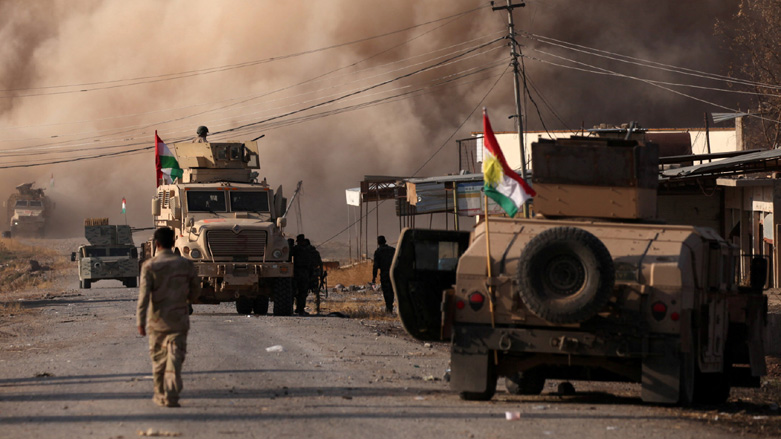Report: US should support joint Iraqi-Peshmerga patrols in disputed territories

ERBIL (Kurdistan 24) – A new report by the Washington DC-based Center for Strategic and International Studies (CSIS) on Friday argues that the United States should support the reinstatement of joint patrols by Peshmerga and federal security forces to prevent the Islamic State (IS) from using a security vacuum in Iraq’s disputed territories to its advantage.
“While the ISF and Peshmerga have been separately conducting limited numbers of successful patrols in rural parts of provinces formerly held by the Islamic State, including Nineveh and Kirkuk, there still have been no joint patrols since the Kurdish referendum in 2017,” read the report, authored by Maxwell B. Markusen, CSIS Associate Director and Associate Fellow.
“Understandably, there are political sensitivities to having the Peshmerga redeploy to Kirkuk, but the alternative is a security vacuum or relying on sectarian militias to patrol Kirkuk, is inviable,” the report continued. “Baghdad must recognize that a multiethnic joint security force of Peshmerga and ISF components would be much more effective at disrupting Islamic State activity than the PMF [Popular Mobilization Units].”
Cooperation between the Iraqi and Kurdish forces collapsed following the Kurdistan Region’s independence referendum in September 2017 and the ensuing attack by the Iraqi military and Iranian-backed PMF militias which drove Peshmerga forces from territories disputed by Baghdad and Erbil that they had controlled for years.
Since then, the security situation in many of those areas has deteriorated, with a resurgence of IS activity generating fears of a prolonged insurgency by the group in Iraq.
In November, the Kurdistan Region Security Council (KRSC) warned that terrorist attacks employing car bombs continue and the assassinations of village leaders and attacks on the electrical grid remain persistent in contested areas.
“While significant trust has been lost between Erbil and Baghdad since the October 2017 offensive in Kirkuk, it’s important that the two governments come together and unite around the issues that they can agree upon,” the report said.
“The United States should support the reinstatement of joint ISF-Peshmerga patrols in disputed regions.”
Markusen suggests that the lack of an official military presence throughout multiple areas, namely in the provinces of Kirkuk and Salahuddin, have enabled IS militants to operate freely.
“This is due in part to the security vacuum caused by the forced withdrawal of Kurdish Peshmerga from these areas following the Kurdish referendum,” the report read.
A US Defense Department inspector general report to Congress in November noted that resolving disputes between Erbil and Baghdad “has been a key to Iraq’s future and could help confront or prevent an [IS] insurgency.”
Friday’s CSIS report went on to voice concerns about the presence of Iranian-backed PMF fighters in the oil-rich province of Kirkuk since October.
“It also has implications for the security and safety of the region’s multiethnic populations, which includes Arabs, Kurds, Turkmen, and other minorities. The PMF have only exacerbated these issues, alienating Sunni Arabs, Kurds, and others,” Markusen wrote.
“In order to keep the threat of a resurgent Islamic State under control in Iraq, a strong and unified response is needed—including both civil and military efforts—from Baghdad, Erbil, and the United States.”
Furthermore, he noted that Iraqi security forces (ISF) and Peshmerga have been successful in disrupting IS cell structures in Iraq, as was recently seen with a coordinated sting by US-led coalition forces and the Kurdish Counter-Terrorism Group (CTD) in October.
But, in the report, he also noted that the Peshmerga have their own issues that need to be resolved “before redeploying to disputed regions to conduct joint patrols with the ISF.”
”The Barzani-led Kurdistan Democratic Party (KDP) and Talabani-led Patriotic Union of Kurdistan (PUK) each have their own Peshmerga forces—known as Unit 80 and Unit 70, respectively—which do not share unified command and control structures,” the report also stated.
For that reason, Markusen suggests that a third “unified Peshmerga command” should “serve as an example of a Kurdish Peshmerga force that could work with the ISF to secure Kirkuk and the surrounding regions.”
Editing by John J. Catherine
